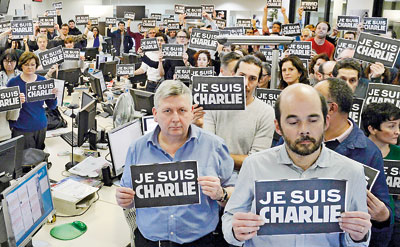Sunday Times 2
Is Charlie Hebdo attack the French 9/11?
PARIS – “France’s 9/11.” In the immediate aftermath of the massacre at the satirical magazine Charlie Hebdo, the comparison with al Qaeda’s 2001 attack on the United States has taken hold across France. Indeed, the January 7 attack was the most murderous France has known since the end of the Algerian War in 1962. But how accurate is the analogy?

Journalists hold placard reading “I am Charlie” as they hold a minute of silence, on January 7, 2015 at the redaction of French news agency Agence France Presse, following the attack by gunmen in the offices of the French satirical weekly Charlie Hebdo. Heavily armed gunmen massacred 12 people on Wednesday after bursting into the Paris offices of a satirical weekly that had long outraged Muslims with controversial cartoons of the prophet Mohammed (AFP)
At first blush, the comparison seems artificial and far-fetched. Twelve people died in Paris, whereas nearly 3,000 were killed in the attacks on New York and Washington, DC. The attackers used Kalashnikovs, not hijacked planes. And, unlike the 9/11 attackers, they were all citizens of the country they were attacking. That is why the attack in Paris 2015 looks more like a combination of two other attacks: the London Underground bombing in 2005 (the terrorists were all national citizens) and the plot executed in Mumbai in 2008 (the terrorists used small arms and targeted people individually).
Yet, despite the major differences, the attacks in Paris and in New York share the same essence. Both cities incarnate a similar universal dream. Both are metaphors for light and freedom. Both belong to the world, not only to their respective countries.
Moreover, in both cases, the targets chosen by the terrorists were highly symbolic. In New York, the Twin Towers embodied capitalist ambition and achievement. In Paris, Charlie Hebdo has given form to the spirit of democratic freedom: the ability to write, draw, and publish anything – even extreme (and at times vulgar) provocations. There is a strong sense in Paris, as there was in New York, that the real target was Western civilisation itself.
Like most Frenchmen, I say, out of disgust for the attack and empathy for the victims, Je suis Charlie – a phrase that recalls the newspaper Le Monde’s declaration, immediately after 9/11: Nous sommes tous Américains.
But I must admit that I did not always feel that way. In 2005, I had reservations about the decision by the Danish newspaper Jyllands-Posten to publish a series of caricatures of the Prophet Muhammad – and about Charlie Hebdo’s choice to reproduce the cartoons the following year. At the time, I felt that it was a dangerous and unnecessary – and thus politically irresponsible – provocation. One does not play with matches next to a gas pipeline or a bundle of dynamite.
Our era is probably much more religious than the eighteenth century ever was. To invoke Voltaire is one thing, I thought at the time, but to act responsibly may presuppose refraining from insulting what is most sacred to others, whether it be Christ, Muhammad, or the Shoah.
Today, given the nature of the attack, I leave those reservations behind, though I resist the temptation to sacralise the victims’ memories, as so many Frenchmen are doing. In France, laïcité, wrongly translated in English as “secularism,” is the equivalent of a religion – the religion of the Republic. For the cartoonists of Charlie Hebdo, religion was just another ideology, and they took aim at all three major monotheistic faiths (though perhaps with a greater emphasis on Islam, probably owing to its more visible fundamentalist face).
So far, a climate of national unity is prevailing in France, just as it did in America immediately after 9/11. And that is as it should be, for unity is crucial to countering terrorists, whose priority is to create division, incite confrontation, and marginalise moderates. Indeed, even Marine Le Pen, the leader of the far-right National Front, initially warned against the dangers of an anti-Muslim backlash, stating that a few lost young men were in no way representative of the majority of French Muslims.
But how long will national unity prevail? The scars of colonialism are fresher in France than anywhere else in Europe; the country has Europe’s largest Muslim minority; and, with moderates seeming particularly weak and divided, the extreme right is cresting in opinion polls.
These ingredients could constitute a recipe for disaster. Already, Le Pen appears to be reverting to form. “National unity is a pathetic political manoeuvre,” she complained, after she was not invited to a rally the day after the attack. But, if the right leaders are at the helm, the January 7 attack could spur a renewed sense of collective purpose and political revival.
We French must face this terrorist attack the same way the Americans did after 9/11: firmly and clearly, but also with responsibility. That means, above all, that we must avoid becoming like America in 2003, when President George W. Bush extended the “global war on terror” to Iraq. France’s task now is to uphold the values that have made it a target.
Dominique Moisi, a professor at L’Institut d’études politiques de Paris (Sciences Po), is Senior Adviser at the French Institute for International Affairs (IFRI) and a visiting professor at King’s College London.
Copyright: Project Syndicate, 2014.
www.project-syndicate.org

